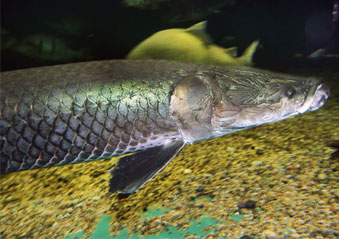Fish decline has ecological impact in tropical river
Fish decline has ecological impact in tropical river
University of Wyoming
August 14, 2006
Dramatic population reductions of a single fish species in a South American river could degrade ecosystem function in an entire river system, according to an article in the Aug. 11 issue of the journal Science.
The authors, Brad W. Taylor and Robert O. Hall Jr. of the University of Wyoming, and Cornell University’s Alexander S. Flecker, studied the ecological consequences resulting from overfishing of the flannelmouth characin, a migratory species in Rio Las Marias, one of several Andean piedmont rivers in Venezuela’s Orinoco Basin. They discuss their results in the article, “Loss of a Harvested Fish Species Disrupts Carbon Flow in a Diverse Tropical River.”
“Changes in fishing net mesh size were strong evidence that the larger individuals had been fished out, and simultaneous decreases in body size from 1 to 0.25 kg indicated fishermen are now overharvesting the smaller flannelmouth characins,” says Taylor, a former graduate student in UW’s Department of Zoology and Physiology and the study’s lead author.
 The Arapaima is another fish species suffering population declines in South America. Photo courtesy of the Steinhart Aquarium in San Francisco. RELATED ARTICLES Farming the world’s largest freshwater fish – an alternative to deforestation The Arapaima (Arapaima gigas), also known as the Pirarucú or Paiche, is the world’s largest freshwater fish. It can reach lengths of up to 14.75 feet (4.5 m) and weigh up to 440 lbs (200 kg). Because of it’s size and tastey meat — the Arapaima has a mild sweet flavor — the Arapaima is one of the most sought after fish species in the Amazon. Today it is rare to find large Arapaima. At 1.3 meters (4 feet), the average length of individuals havested from the wild is below the average length of sexual mature fish (1.5 meters – 5 feet). Vampire Fish discovered in the Amazon A new species, dubbed the vampire fish,’ was recently discovered in the Araguaia River of the Amazon Basin. The origin of the ominous title is the species’ form of feeding. The yet unnamed fish is a parasitic species, that lives off the blood of its hosts. The vampire fish’ is a close, but smaller relative of the candiru, a similarly parasitic, blood-sucking species of catfish found in the same region. Exploring freshwater fish habitats in the rainforest of Peru Many popular tropical freshwater aquarium fish originate in the world’s tropical rainforests. The Amazon Basin is a particularly rich source of fish — 5000 species are estimated to be swimming in its many streams, rivers, and lakes. This fall the editor of mongabay.com, a leading environmental science and tropical freshwater fish information site, traveled to the Peruvian Amazon and examined habitats for freshwater fish. As a result of this effort, two new “biotope” descriptions have been posted on the site. The descriptions include underwater photographs for those interested in replicating the natural conditions of these habitats. |
“Our research assessed the potential ecological consequences of this shift in fish harvest, which is occurring in many parts of South America.”
The researchers report, “Size-selective harvesting may have long-lasting negative feedbacks on fish populations, ecosystem function, and the flow of protein to humans and other animals, eroding an important ecosystem service.”
These fish, which feed on particles deposited on the stream bottom, play a significant role in carbon flow and nutrient cycling, Taylor says. As the fish feed, they stir up, consume and egest large amounts of dissolved and particulate nutrients. The researchers say these processes are important for nutrient transport and the flow of carbon through the ecosystem, especially during the dry season when transport by floods is reduced. The researchers discovered that during a six-year period, larger migrations of the flannelmouth characin were associated with greater downstream transport of organic carbon, which is an important energy and nutrient source to downstream ecosystems.
They also identified another adverse consequence of the species decline. The bottom-feeding fish remove organic matter that shades nitrogen-fixing algae. When the fish were taken out, bacterial respiration increased, so more organic carbon was consumed and converted to carbon dioxide by bacteria rather than being transported downstream and more evenly distributed among organisms.
“The loss or decline of this fish species could extend throughout the stream network and food web, affecting populations algae, bacteria, insects and other fish species,” says Taylor.
The findings have several implications for conservation management and understanding of ecosystem function. Taylor makes recommendations to offset the consequences of the declining flannelmouth characin population. He says dams have greatly limited the movement of fish within the Orinoco Basin, so dam construction should be limited and fish ladders should be installed on existing dams to facilitate fish movement.
Another solution would be to enforce fisheries laws. The smaller mesh sizes now in use are illegal in Venezuela, but Taylor says the laws are not enforced, in part because law enforcement personnel recognize the importance of the fish to the local peoples’ diets.
Much of the research on manipulating freshwater fish populations has focused on large predatory fishes, but less attention has been given to smaller fishes even though half of all fish species are less than six inches in length, and 90 percent are less than two feet long. As populations of the larger fish decline, Taylor says more emphasis needs to be placed on learning more about these abundant smaller fish populations.
“Usually they are less charismatic visually, but that does not mean they are unimportant or unworthy of equal status and protection,” he says.
This is a modified news release, “Declining Fish Population has Broad Ecological Consequences”, from the University of Wyoming.